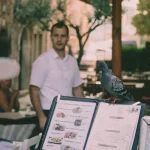As Poslovni Dnevnik/Suzana Varosanec writes, with the lack of foreign workers currently available, the mother of all problems for chefs has opened up, and in anticipation of a good summer season for this profession, wage offers are ranging from 10,000 kuna to top chefs who could earn about 3,000 to 5,000 euros.
Every place along the Adriatic coast lacks about 50 chefs, claims Pero Savanovic, a well-known and award-winning chef with 30 years of experience and a frequent member of the jury at international gastronomic competitions.
He has now taken over the position of head chef at Matrioska, a restaurant in the Baska Voda Hotel group, but as he has run top restaurants all along the coast, and is active in Chefs Club Croatia and Chef kuha doma, he estimates that almost every hotel is experiencing a staff shortage of around 20 to 30 people, part of whom are on the chef’s team.
This, he says, can be confirmed by employment agencies: They offer staff from the region, and the least of all from Croatia, so that according to Savanovic, only auxiliary chefs are being hired from the Croatian market in a share of only 2 or 3 percent. The situation is similar with other occupations related to tourism – waiters, beach workers, gardeners….
Numerous catering and hospitality facilities are failing to find professional and quality workers amid this Croatian labour force issue, and for those who get their hands on staff through agencies, such as young chefs, they mention the problem of a low level of knowledge and will.
“The Croatian labour force issue and the shortage of staff is a serious threat to tourism. The problem that has been going on for several years because has erupted and become worse since the pandemic began as the industry had to change. When they saw that they would be out of work for a while, they turned to less risky jobs,” explains Savanovic.
“Yes, we have a problem, even after a large number of people have retrained,” confirms another well-known local chef, a member of the jury of the reality TV show Three, Two, One – Cook. Ivan Pazanin adds that Croatia experienced a huge issue in this regard ever since the pandemic struck the country.
“We need to hold tight for the next few months and after the summer we need to make an analysis and come up with an action programme. We had a gastronomic boom and now the market is experiencing that with all the good and bad consequences that come with it,” says Pazanin, who opened a Dalmatian street food bar in the very heart of Split, inside Diocletian’s Palace.
“I’m very satisfied: I came up with the concept in accordance with my preferences and now it turns out that the market has accepted it very well,” says Pazanin.
The problem with chefs is also more pronounced in Zagreb’s restaurants than it ever was before the pandemic. According to the head of the operations office at the RougeMarin Restaurant, Matej Kobad, the restrictive anti-epidemic measures have taken their toll, and a lot of damage has been caused by the lockdowns and closure of those facilities.
“Not only did earnings drop, people lost their jobs, but a lot of chefs and waiters switched to other industries,” he says, confirming that there are great difficulties in finding chefs, with an emphasis on auxiliary ones. Despite that, says Kobas, in anticipation of a very good summer season, they prepared a new investment and through a lease they expanded RougeMarin Park to an additional 2000 m2, where, in cooperation with the fashion.hr agency, they’re developing the concept of festival events. Outdoor events are the future, as the pandemic has changed consumer habits.
This situation with Croatian labour force market has led to more and more employers in this industry importing Filipino, Indian and Nepalese workers.
For example, in Camp Bunja on the island of Brac, they had offers from four agencies for such workers. Finally, people from India were employed, with an apostille of impunity certified by an Indian and Croatian notary. It took about a week and a half, because India was in lockdown. As is well known to anyone who has attempted to engage in anything remotely administrative in Croatia, the issuing of work permits for third country nationals can take up to two months.
They now have a chef in the camp, but what if someone cancels, director Lana Ivicek wonders, revealing that they have had two such cases in the last month. First, they hired a Montenegrin chef, but while he was waiting for his papers, he found another job instead.
Then a young man from Argentina applied, and in the end a chef from Bosnia and Herzegovina was hired, for whom they are still completing the legal procedure. Ivicek says that the camp has 50 accommodation units with a bistro capacity of 60 guests. Occupancy is now at the level of 30%, but they expect 100% in the height of the season, so Ivicek believes that the procedure for hiring foreigners should be facilitated and accelerated so as to try to patch up the continued issues with the Croatian labour force.
Gordan Skoric from Danas radim believes that the reform of the Permanent Seasonal Institute is necessary, which supports the initiative to shorten the concept from six months to at least five, so that those interested in seasonal jobs can meet the criteria.
“If you’re a permanent seasonal worker and have a full year of income, it’s considered that you’re a permanently employed person, but the season has been significantly shortened. If the conditions are set at five months, companies could hire permanent seasonal workers, and wouldn’t then have to lay them off. In previous years, they’d have hired them at the end of April, counting on the season to start, which worked to some extent, but last year the season was reduced to three months,” he explains. On the other hand, the profession is concerned about the future of the Croatian gastronomic scene.
Savanovic believes that Croatia will become focused on the import of cheap labour, and therefore poor quality will be the end result.
For more, follow our business section.










